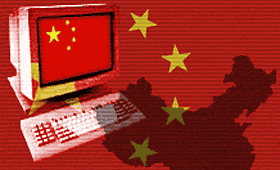Concerns over the growing international acceptance of the “China model” of internet control–a trend that was a main focus of Freedom House’s annual “Freedom on the Net” report last November–have lately been on the rise. Analysts have warned of a “digital iron curtain” separating Washington’s and Beijing’s emerging spheres of global tech influence and competing approaches to internet governance and digital rights, and a growing number of countries–including India, Russia, Vietnam, and most recently, Thailand–have been noted to be eagerly adopting Beijing’s model of internet control. At Bloomberg, Lulu Yilun Chen and Yoolim Lee report on the trend as a “new Cold War” in which Washington is currently losing ground as autocratic regimes around the world become increasingly enticed by Beijing’s approach:
The more free-wheeling Silicon Valley model once seemed unquestionably the best approach, with stars from Google to Facebook to vouch for its superiority. Now, a re-molding of the internet into a tightly controlled and scrubbed sphere in China’s image is taking place from Russia to India. Yet it’s Southeast Asia that’s the economic and geopolitical linchpin to Chinese ambitions and where U.S.-Chinese tensions will come to a head: a region home to more than half a billion people whose internet economy is expected to triple to $240 billion by 2025.
“For authoritarian countries in general, the idea of the state being able to wall off to some extent its internet is deeply appealing,” said Howard French, author of “Everything Under the Heavens: How the Past Helps Shape China’s Push for Global Power. “This is about the regimes’ survival in an authoritarian situation. So that’s why they like to do this. They want to be able to insulate themselves against shocks.”
[…] The crux of a Chinese internet model is data sovereignty: information of citizens must be stored in-country and accessible on demand to the authorities, a concept enshrined in Chinese law since 2017. That’s raising hackles in Washington, which aims to counter Beijing’s sway — a longer-term struggle that may be the single most important episode in world affairs since the collapse of the Soviet Union. Escalating tensions between the two richest economies will impact just about every country across the planet — economically and socially.
[…] “The most likely scenario now is not a splintering, but rather a bifurcation into a Chinese-led internet and a non-Chinese internet led by America,” the former Google chief [Eric Schmidt] executive reportedly told a private venture capital gathering in September. “Globalization means that they get to play too.”[Source]
At the South China Morning Post, Zheping Huang wonders if Western countries–who are currently struggling to find new ways to regulate internet giants that have allowed the manipulation of elections, the live-streaming of violent terrorism, and the proliferation of expressions of pedophilia—might eventually adopt some of Beijing’s methods themselves. Huang then continues to list eight “tools” that China has pioneered for internet control, including the Great Firewall, the regular use of targeted content bans, human content moderators, and the ideology of data sovereignty:
Governments around the world are scrambling to hold internet companies accountable for what is published on their platforms amid renewed fears about the spread of harmful content on social media. Last month Facebook enabled an Australian gunman to live stream a mass shooting that left 50 people dead in New Zealand. Though the account was quickly shut down, a video of the massacre circulated online, raising concerns about the consequences of a largely unfettered internet.
In recent weeks, governments in countries including the UK and Singapore have moved to take a more active role in defining the boundaries of acceptable online discourse. Lawmakers in Australia, for example, passed a sweeping law to punish tech giants like Facebook and Twitter if they fail to remove inappropriate material from their platforms “expeditiously”.
All of this will sound familiar to China. The Chinese government runs the world’s most sophisticated censorship machine, powered by a combination of laws, technology, and human scrutiny. While the West is extremely unlikely to adopt China’s model wholesale – there may be some tools that can be adapted. Here’s a look at some of them. […] [Source]
Washington has long been wary of tech from homegrown Chinese firms over national security concerns stemming from the CCP’s ability to demand these firms’ cooperation. As Chinese tech firms become increasingly sophisticated, valuable, and competitive on the global stage, the Australian Strategic Policy Institute has launched “Mapping China’s Tech Giants,” a tool to “better understand the enormous scale, complexity and increasing reach of some of China’s tech giants.” The executive summary of an accompanying ASPI report describes the project:
The CCP has made no secret about its intentions to export its vision for the global internet. Officials from the Cyber Administration of China have written about the need to develop controls so that ‘the party’s ideas always become the strongest voice in cyberspace.’1 This includes enhancing the ‘global influence of internet companies like Alibaba, Tencent, Baidu [and] Huawei’ and striving ‘to push China’s proposition of internet governance toward becoming an international consensus’.
Given the explicitly stated goals of the CCP, and given that China’s internet and technology companies have been reported to have the highest proportion of internal CCP party committees within the business sector,2 it’s clear these companies are not purely commercial actors.
ASPI’s International Cyber Policy Centre has created a public database to map the global expansion of 12 key Chinese technology companies. The aim is to promote a more informed debate about the growth of China’s tech giants and to highlight areas where this expansion is leading to political and geostrategic dilemmas. It’s a tool for journalists, researchers, policymakers and others to use to understand the enormous scale and complexity of China’s tech companies’ global reach. […] [Source]







